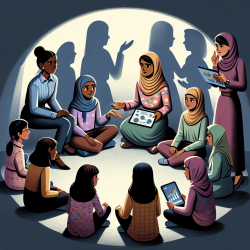As practitioners dedicated to the wellbeing of children, it's crucial to leverage research findings to improve therapeutic outcomes. A recent study titled Social Anxiety Disorder: Associations with Peer-Liking, Discrimination, and Prejudicial Feelings in Early Adolescent Girls offers valuable insights that can be applied in educational and therapeutic settings.
Social anxiety disorder (SAD) is prevalent among adolescents and can significantly impact their social interactions, educational achievements, and overall wellbeing. This study explored how early adolescent girls perceive and interact with peers exhibiting SAD symptoms, focusing on peer-liking, discrimination, and prejudicial feelings.
The study involved 103 girls aged 10-13 years from three schools in Australia. Participants were randomly assigned to either a control group (non-SAD vignette) or an experimental group (SAD vignette). They completed an online survey to assess their responses to hypothetical peers with or without SAD.
Key findings include:
- Contrary to expectations, students in the SAD group reported higher levels of peer-liking compared to the control group.
- Students in the SAD group exhibited higher levels of pity and lower levels of fear towards their peers with SAD.
- Importantly, students in the SAD group demonstrated less discrimination (preference for social distance) compared to the control group.
These findings suggest that early adolescent girls may have a more compassionate response to peers with SAD, characterized by higher levels of pity and peer-liking, and lower levels of discrimination. This is a promising indication that interventions promoting positive peer relationships could be particularly effective in female educational settings.
To translate these findings into practice, practitioners can:
- Develop and implement peer programs that foster empathy and understanding towards students with SAD.
- Encourage inclusive activities that promote social interaction and reduce feelings of isolation among students with SAD.
- Provide education and training for students and staff to increase awareness and reduce stigma associated with social anxiety.
These strategies can create a supportive environment that mitigates the negative impacts of SAD and promotes positive developmental outcomes.
Future research should aim to generalize these findings across diverse gender and socio-economic groups to enhance their applicability. Understanding the nuances of peer responses in different settings can further inform targeted interventions.
To read the original research paper, please follow this link: Social Anxiety Disorder: Associations with Peer-Liking, Discrimination, and Prejudicial Feelings in Early Adolescent Girls.










